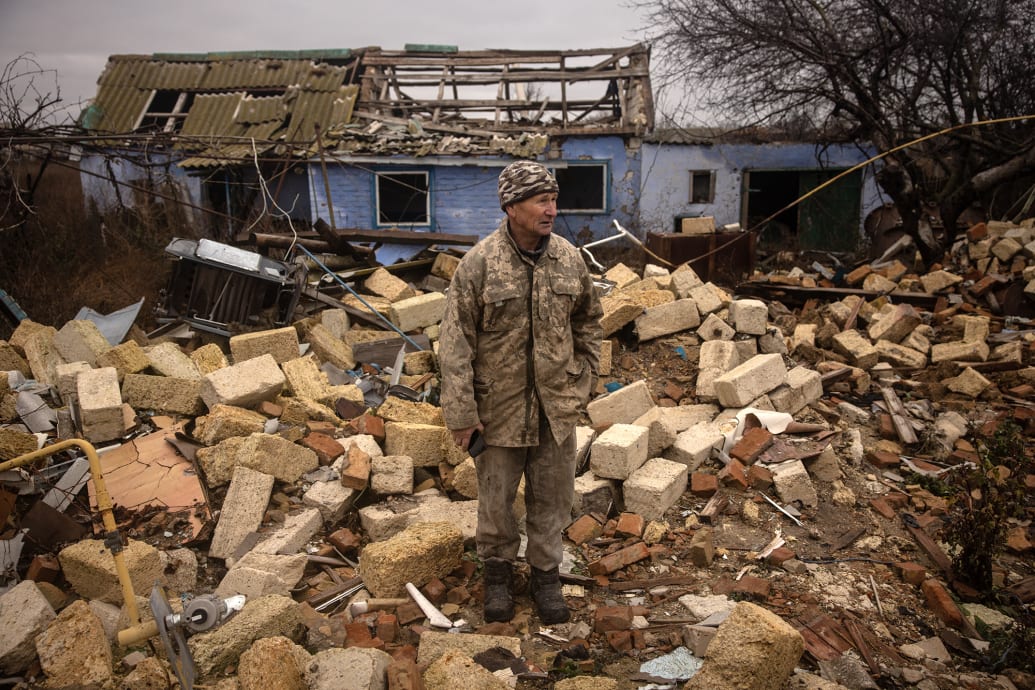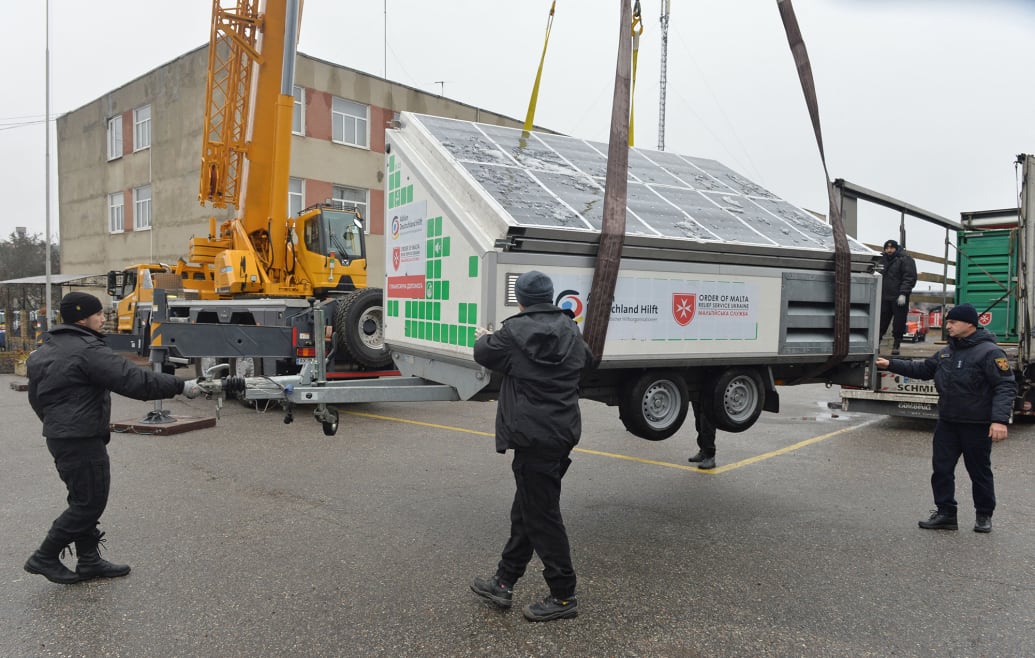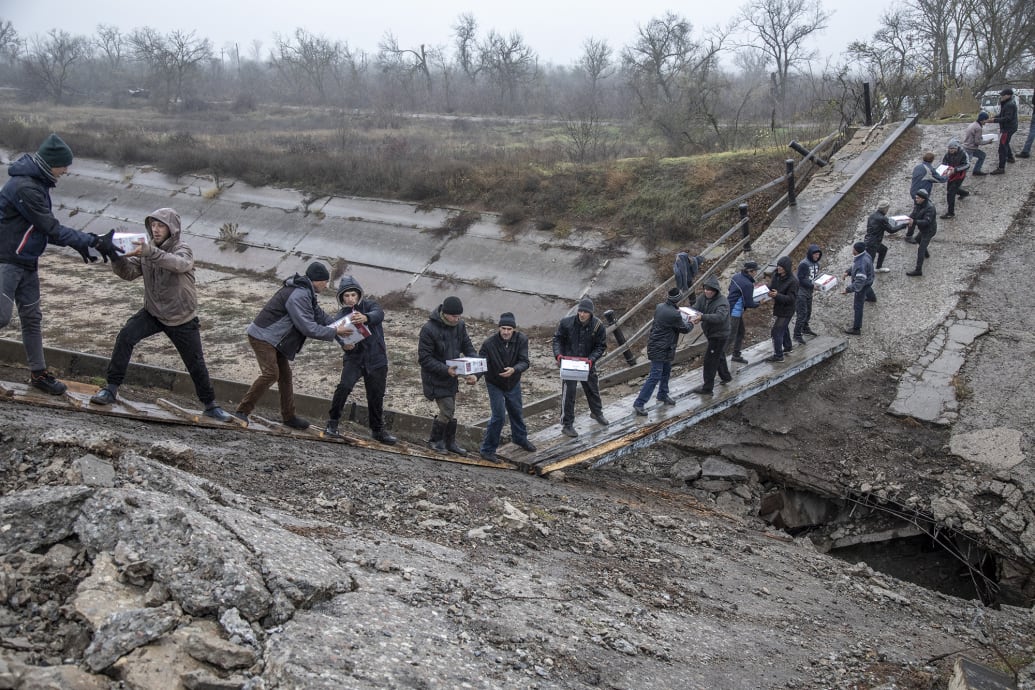A. Craig Copetas
PARIS—More than 500 Western financers, politicians, and industrialists flooded the French Ministry of Finance this week for a European fundraising burlesque aimed at resurrecting Ukraine from Vladimir Putin’s devastation.
The pockets of French President Emmanuel Macron—and others who attended Tuesday’s Bilateral Franco-Ukrainian Forum for Resilience and Reconstruction of Ukraine—were emptied of some $1 billion. The immediate pledge to fix Ukraine’s obliterated power grid and other public utilities doesn’t come close to the $1 trillion Ukraine needs to fully rebuild the country, but there’s an even bigger problem at hand.
The war-ravaged country needs an insurance agent willing to secure their investment against Putin, who could choose to destroy the infrastructure they’ve vouchsafed to recreate by April 2023. The Russian president’s belligerence isn’t covered under the umbrella policies offered by the likes of insurance giants Lloyds of London or the GEICO Gecko.
That’s a gamble for the ages.
“It’s not just where the insurance guarantees will come from,” says conference delegate Anastasiya Shapochkina, founding partner of the economic consultancy Eastern Circles and a lecturer on Ukrainian-Russian affairs at Sciences Po. “We’re trapped in a loop because no one is explaining the rules of the game or where and how to actually acquire reconstruction money.”
Some folks suggest the solution can be found in Punxsutawney, Pennsylvania.
“It’s Groundhog Day in a war zone with [Ukrainian President Volodymyr] Zelensky playing the role of Bill Murray,” a senior U.S. intelligence official charged with monitoring the conflict says. “Putin isn’t going to stop and he’ll take out whatever is rebuilt just for spite.”

Anatoly Sikoza who buried the bodies stands amid the rubble of a house where Russian forces killed seven men and one woman, hands bound, blindfolded and shot at close range, before blowing up the site in a bid to cover the killings in a village on the outskirts of Kherson on Nov. 27, 2022 in Kherson, Ukraine.
Chris McGrath/Getty Images
Although there’s no doubt that Zelensky’s benefactors are sympathetic and eager to fashion what Shapochkina describes as “an overall expectation that postwar Ukraine can emerge as a second Germany in terms of industrial capacity,” intelligence officials say those efforts are doomed to fail until Putin is removed from the trillion-dollar calculation.
Indeed, Western military intelligence officials speaking on background say the only reconstruction math that matters is the number of munitions.
“The Russians are firing about 20,000 artillery shells a day, most of them more than 40 years old,” an analyst explains. “Ukraine fires back with between 4,000 to 7,000 rounds a day. Russia can’t keep that up, so even if they cut back to 10,000 a day—not including rockets and weapons attached to drones—that’s still a lot of hellish damage to the rebuilding effort.”
President Macron nonetheless vowed, “each time a territory is liberated by Ukraine, we need to rebuild as soon as possible,” he said, echoing the encouraging words voiced by representatives from some 50 countries and platoons of unarmed multinational organizations. “If you help us,” Zelensky prodded over a video link from Kyiv at the summit, “that can stop a huge wave of refugees coming into your countries.”
“Countries have pledged money, but it’s only after the war when you see if the money is realized.”
Intelligence officials told The Daily Beast that spending money to revive infrastructure in the hope of stemming a new tide of refugees is a dangerous distraction from fighting the war.
“There’s another elephant in the room,” warns one intelligence specialist. “How do the politicians dispense what will undoubtedly amount to more than $1 trillion in a country that’s historically corrupt.”
Tim Wright, co-founder of the crowdfunding firm TwinTangibles in Glasgow, says trying to raise money to rebuild a country under the tumult and frenzy of war is “tricky” business.
“Actually,” he corrects himself with a gloomy laugh, “it’s extraordinarily difficult. Our sector has crowdfunded money for Ukraine to purchase drones and other war material, but we accomplished that with the specific goal of beating the Russians on the battlefield. I’m unable to envisage a specific financial reconstruction plan until Ukraine wins that war.”

Employees of the State Emergency Service of Ukraine unload mobile power generating station as part of international humanitarian aid in the city of Kharkiv on Nov. 21, 2022.
Sergey Bobok/AFP via Getty Images
Perhaps the safest wager is that the Russians assuredly will not contribute to the cause.
Forensic accountants have spent the past ten months attempting to track and assist governments in isolating and confiscating the shielded offshore assets of the hundreds of oligarchs and other Russians officials who feed off the Kremlin ration. Many say the capture of Putin’s projected $200 billion fortune remains in limbo.
Just last week, for instance, a confiscated $1 billion superyacht owned by Russian oligarch and Putin pal Nikita Mazepin mysteriously vanished from police custody on the Italian island of Sardinia. The vessel is apparently now in Tunisian waters, immune from international sanctions, and no longer under threat of being auctioned off to ease Ukraine’s financial woes.
“Any proceeds seized could perhaps contribute, but we really don’t know for certain,” reckons one Wall Street fiscal sleuth who’s been on the case for a European government since March. “Our suspicion is the Americans will continue funding Ukraine through the reconstruction phase.”
The hot-button question without a consistent answer is whether the Biden administration and the newly elected Republican-controlled U.S. Congress, lumbered with a national debt of $31 trillion and growing, have the political resolve to contribute a penny to subsidizing an ersatz Marshall Plan designed to rebuild Ukraine while Putin remains in the Kremlin.
“Countries have pledged money, but it’s only after the war when you see if the money is realized, the money that’s promised is actually sent,” Boris Najman, a former economic adviser to the Ukrainian government, said.

Locals help transferring humanitarian aid across a collapsed bridge near Novopetrivka, following the withdrawal of Russian troops from Kherson region, Ukraine, Nov. 17, 2022.
Narciso Contreras/Anadolu Agency via Getty Images
One investor with real skin in the blooded trenches is the European Bank for Reconstruction and Development. The bank has ponied up more than 1 billion of the 3 billion euros it’s committed to Ukraine through 2024, to maintain energy and food security, restore railways, and support the pharmaceutical industry.
“It’s appalling to see the damage done by Russia’s invasion,” EBRD President Odile Renaud-Basso said. “I will keep saying it—we stand by Ukraine.”
Perhaps understandably, Ukrainian officials in Paris nonetheless privately complained that the promised cash isn’t arriving with the speed of a Russian rocket. So no surprise that the gathering ended with conventioneers bopping the night away to a Weimar-era performance by the dark cabaret band Dakh Daughters, seven Ukrainian women costumed in punk ballerina outfits, singing their troika of hit songs, It’s a Pity, No Time and What the Hell are You Thinking?
No comments:
Post a Comment